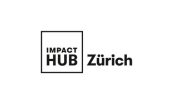
July 2016
Mashup #SustainableFood: „How to grow, buy, and eat your food to protect our planet“
It was the fasted Impact Hub Mashup event to sell out and the largest one so far. About 100 people attended the global event on the hot evening of June 30, to listen to the four presenters about the different trends and projects around sustainable food. Just like our first Impact Hub Mash up on #OpenData and the second one on #Tech4Good, we were joined by other Impact Hubs for this event: Impact Hub Kings Cross, Kuala Lumpur and Stockholm. All the impressions and stories of the night were collected with the hashtag #impacthubmashup on a tagboard.
Let's jump to the fast and dynamic input speeches of the night all presented in the pecha kucha format:
Empowering everyone to do what is best for our planet: Manuel Klarmann from Eaternity
Roughly 1/3 of our CO2 emissions come from our food. By changing our food choices and eating habits, every single person can contribute to reducing CO2. And the best thing? It does not even cost you money, it even saves you some! Manuel and his co-founders have always been fascinated by computers and artificial intelligence, the kind of technology that really enriches your life. For their project Eaternity, they have started to asses how our food is processed, learning how much CO2 was needed to prepare and produce different ingredients, and thus measuring the ecological footprint of meals.
There is no technical miracle, it’s all about being smart, educating oneself and choosing differently to have a big impact! – Manuel Klarmann
With all the information they gathered, they produced an app that helps people to understand what climate friendly meals look like. In a nutshell: If it is local and seasonal and does not include meat, our planet will love it. Today over 130 restaurants including the Migros Restaurants in Switzerland offer climate friendly meals with the help of the calculations of Eaternity. And even after meeting Kofi Annan, the team of Eaternity wants more: „We need to make vegan and vegetarian meals a lot more attractive!“. Well, let’s go then!
Back to the roots: Jonas Schmid from gmüesgärtli.ch
Big city life and growing your own food often seem mutually exclusive. But that’s no longer true. Jonas Schmid and his crew from Gmüesgärtli, meaning „tiny vegetable garden“, have created a great way to make gardening available for everyone. With their product, a recycled wooden palette usually used for transportation filled with soil and seedlings, they enable everyone to get their own vegetable garden in the smallest spaces. Besides delivering everything straight to your doorstep, their concept has other benefits: 1) the food is local, seasonal and sustainable, 2) it tastes a lot better and 3) a green city saves tons of energy and emissions.
Our goal? Every balcony in the city should have some green mini gardens. – Jonas Schmid
When asked about their biggest problem, Jonas honestly stated: „Logistics! The way we have to transport and deliver the boxesis not very sustainable yet. We really hope that Tesla starts building trucks soon!“. While we keep our finger’s crossed that this happens soon-ish, the Gmüesgärtlis will green up your balconies for pure recreational purposes and spice up some Kindergardens for educational purposes.
Know where you coffee comes from: Christian Burri from Algrano
Most of us drink it daily yet we hardly know anything about it. Or would you be able to tell us how your coffee made it all the way to your kitchen table? Christian Burri and his team set out to change this with Algrano. With their online platform coffee producers can directly connect with the coffee roasters. And with Algrano only supplying the shipping as a service they are creating a more direct supply chain.
Next time you order a coffee, ask your roaster where the coffee comes from! – Christian Burri
With the internet penetration growing 10% per year in Latin America, this „Facebook for Coffee“ has a huge potential for impact. With already over 250 coffee growers on their platform, a lot of famers have already turned into empowered entrepreneurs. And we can benefit from it too: Your roaster will be able to tell you exactly where your coffee comes from. Try it out the next time you order a coffee at the Auer & Co. café at Colab. The coffee from the roastery Mirò gets all their beans directly from the producers.
Nutrigenetics - The wave of the future: Dr. Martin Kohlmeier, research professor for nutrition and precision medicine at the University of North Carolina
Our special guest of the night is a very spontaneous one: Dr. Martin Kohlmeier jumped in for a speaker that had to cancel last minute. His deep dive into the world of nutrigenetics is as unexpected as fascinating. Although we all know that we are different (be that our gender, ethnicity or eye color), we tend to fall into the trap that we follow nutritional advice without further thinking about it. However, people respond very differently to things they consume - in both a good or bad way. For example, based on your genetics, you may benefit from more, or less, of certain vitamins or minerals – such as folic acid, or iron, respectively. What's good for one person's diet is not necessarily good for another. Looking at the genetics helps us understand how certain intolerances, differences in metabolism, deficiencies and mismatches of nutrients arise.
There is no one size fits all in nutrition. Our genetics define how we react to what we consume. – Martin Kohlmeier
Our nutritional environments shape our genetics, we naturally adapt to what we are exposed. That is also why in most regions of the world people are not able to digest to digest milk (lactose). Whereas people in Thailand have not been in contact with milk products, a privileged percentage of Central Europeans are pretty good in digesting it because this region has raised dairy cattle for hundreds of years. Diving into the world of nutrigenetics helps us understand and change the way we eat and grow food - and can bring about big change.
All the presentations of the nights have shown that the way we grow and consume food has a huge impact on our planet and wellbeing - and it has the potential to change the world. So next time you eat or drink something, challenge it and think beyond.
See you at our next Mash Up event in September!
Subscribe to Our Newsletter
Never miss an update – sign up for our newsletter published every 3-4 weeks and stay connected with our community.


